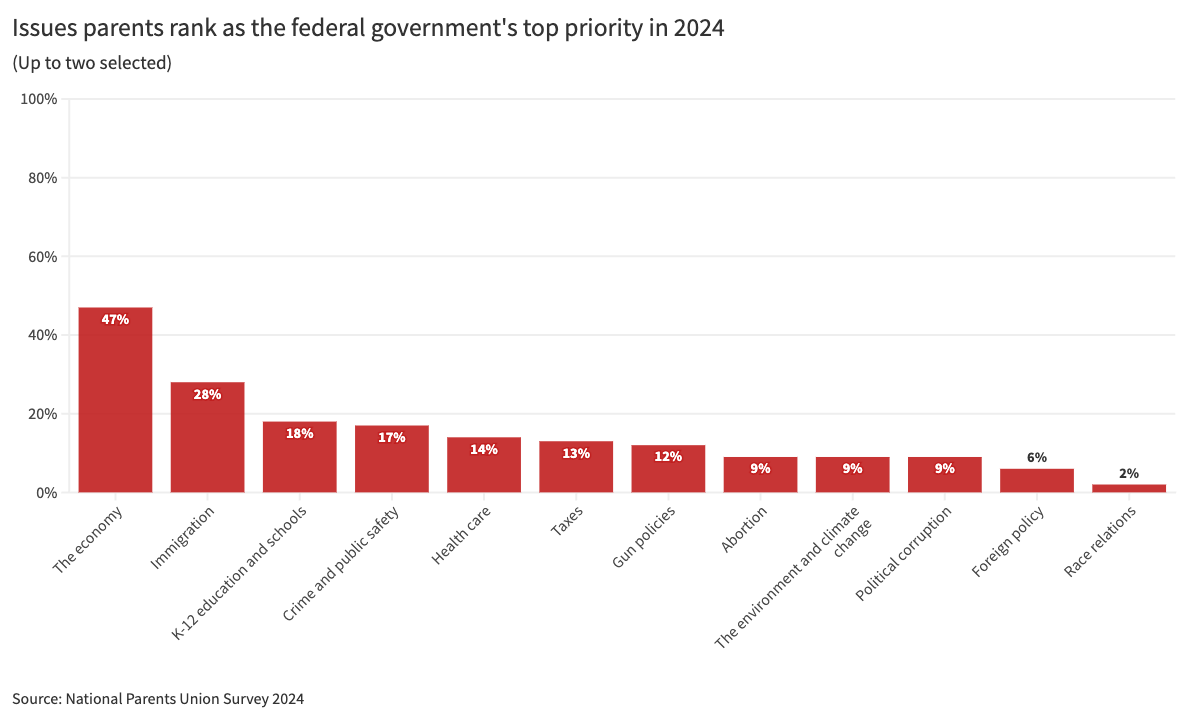Parent Poll: It’s the Economy — Not Culture Wars — Worrying Them & Cellphones OK
A new National Parents Union survey finds broad support for direct federal funding to help families and few fans of school cell phone bans.

Get stories like this delivered straight to your inbox. Sign up for The 74 Newsletter
Parents from across the political spectrum support providing public funds directly to families for resources like tutoring, internet access and mental health care, according to a survey released today by the National Parents Union. An overwhelming majority also report that despite concerns about social media, they value their kids’ access to cell phones at school.
The results come from a survey that polled 1,506 parents of K-12 public school students conducted by the National Parents Union between Feb. 6-8.
For the past four years, the organization has surveyed parents leading up to the State of the Union address, “because we want parents to be able to give their own State of the Union,” said founding president and 74 contributor Keri Rodrigues. All questions are written by parents who serve on the group’s Family Advisory Council, composed of delegates across the country that represent different intersections of American families.
While some results were unsurprising — like parents welcoming more financial support — they are still important, according to Rodrigues, because they serve as an essential message to policymakers about what parents care about. “We have these little, ‘We told you so moments.’ I think this is yet another one.”

Rodrigues said that voters are repeatedly and inaccurately told that parents are angriest about hot-button, culture war issues.
“We have consistently said to people, ‘Please, listen. Look at the data …’ It is clear,” she said.
“Parents are struggling with economic issues … Inflation, the cost of living, people living on the edge. Parents and families are scared and they’re hurting.”
“We are obviously focused on education justice but economic justice for families is equally important to us,” Rodrigues added later, “because we really deal with the intersectional issues … we just don’t think you can separate those things.”
Overall, surveyed parents ranked K-12 education as the third most important issue for the president and Congress to address, behind the economy and immigration.
“In education, we think we’re the center of the universe, and we’re not,” Rodrigues said. “We’re a piece of the puzzle. It’s relevant, it’s in the mix, it’s definitely a concern. But we have to understand the intersectionality of the larger political context and where we fall in it and how it competes with other issues for the average voter and for the average American family.”
According to another survey released by the organization in November 2023, voters trust Democrats slightly more on education and Republicans by a small margin on the economy. The majority of parents reported wanting policymakers to work together to find bipartisan education policy solutions, even if it means compromising with people they disagree with.
“It just makes me crazy that our elected officials don’t listen,” Rodrigues said. “There are really big, important things that American families want us to do,” including the child tax credit, which President Biden pressed for during last week’s State of the Union, and stronger, evidence-based reading and literacy programs.
“We can do big things,” she continued. “We can have unity … The majority of us can agree on some big, important things.”
Of parents surveyed in February, 87% were in favor of expanding the child tax credit and 85% were in favor of expanding subsidies to reduce health insurance costs. The vast majority were also in favor of providing funding directly to families of K-12 public school students to help them pay for supplemental resources such as tutoring.
The survey did not include questions about more controversial vouchers, which let parents use taxpayer money to send their kids to private schools. The National Parents Union is known for both its criticism of traditional public schools, including teachers unions, that is sometimes seen as aligning with pro-school choice education reform forces and for elevating the voices of parents, especially lower-income parents of color.
Over 80% of surveyed families want the federal government to support all K-12 public schools via counseling and mental health services, free school lunch, free, high-quality preschool programs and increased funding for schools in low-income communities.
Among the 484 parents who responded to demographic questions, 27% consider themselves to be conservative, 24% liberal and 43% moderate. They were also socioeconomically and geographically diverse. About half of respondents were white, 15% Black, 24% Hispanic or Latino and 3% Asian. The margin of error is plus or minus 2.9 percentage points.
While the vast majority of school districts across the country have received additional federal funding to address COVID-related challenges, only 27% of parents reported having seen or heard anything about how these ESSER dollars were being used in their kids’ schools.
Just over 70% of parents, though, did report that their child’s public school had provided laptops or tablets for students since 2021 and about 45% said schools were offering additional tutoring or counseling services, which could have been supported by pandemic relief funds.
The ESSER funding results, Rodriguez said, reveal that parents did not get the voice they were promised in how that money was spent and that “a lot of things that we actually wanted — like additional mental health support — were not realized.”
“Are we whipping laptops and chromebooks at kids? Hell yes we are. Is that necessarily a good thing? I mean a lot of parents would argue that that’s not actually getting us to the outcome.”
Pro cell phones, wary of social media use
To help inform the survey’s focus, Rodrigues said the National Parents Union presented data to their Family Advisory Council around student use of social media and its impact on mental health.
A new understanding emerged from these discussions: Parents view cell phones and social media as separate issues, yet the two have become convoluted. This reframing was a lesson for her, she said, both as president of the organization and as a mother.
This same distinction was borne out in the survey results, she said: Parents want their kids to have access to their phones during the school day so that they can stay in touch with them, but they also recognize the dangers of social media and its negative impact on their children.
The top reasons kids use their phone, according to surveyed parents, is to contact family members, play games, contact friends, listen to music and take videos. A majority of parents (65%) also reported that their children used their phones for social media and 83% said there should be a minimum age limit on when kids are allowed to have their own social media accounts, with the largest share (20%) citing age 13. Just under 30% of parents said their children spend somewhere between four and five hours a day on their phone.
Despite social media concerns, nearly half of parents said their child’s cell phone use had a positive impact on them and an additional 42% said phones have about an equally positive and negative impact.
Parents listed a number of reasons they want their kids to take phones to school, with about 80% saying it was so they could use it in case of an emergency. About half of parents said it was an important tool for coordinating transportation to and from school, and 40% said they want their kids to be able to communicate with them about their mental health or other needs throughout the day.
Just over half of parents believe that kids should sometimes be allowed to use their cell phones in school, while about a third believe students should be banned from using phones unless they’re needed for a medical condition or disability. There was very little parent support for locking up students’ cell phones in secure pouches or containers.
“I think it goes back to something that we have been talking about since the beginning of the pandemic and the Great Parent Awakening,” Rodrigues said, “which is that the implicit trust that parents have in schools— that they’re going to tell us what’s going on and the communication — a lot of that has eroded. And that’s not toothpaste you can put back in the tube.”
Disclosure: Walton Family Foundation provides financial support to the National Parents Union and to The 74.
Get stories like these delivered straight to your inbox. Sign up for The 74 Newsletter

;)
